#in defence of de-persons
Text
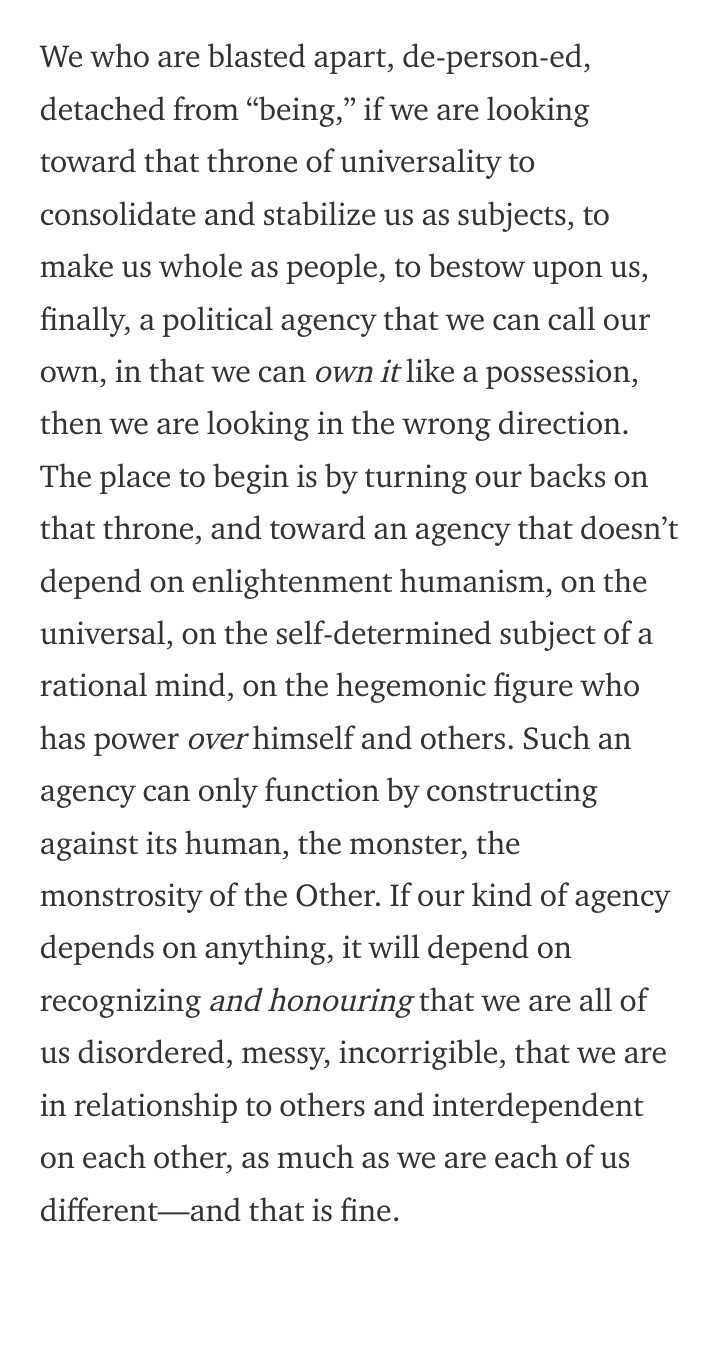
Johanna Hedva, "In Defence of De-persons" [ID in ALT]
253 notes
·
View notes
Text
Ambien + chocolate liquor we'll see how it goes
#in my defence i had to answr to important Party texts AFTER i took my ambien and the effects are going away and i want to sleep so#liquor it is#it doesnt taste very good so id rather have baileys or crema de orujo but alas i dont gace those#personal shite
0 notes
Text
power signalling
Kneeling.
Ordered to kneel as punishment or as a show of deference.
Shoved physically to the ground by hands on their shoulders, maybe a kick to the back of the knee.
Picking themself up off the ground but only getting as far as hands and knees.
Crawling because they haven't got the strength to stand anymore.
Dropping to their knees from exhaustion or despair.
Personal space.
Casually invading it.
Uninvited touch - from the deeply creepy to something as simple as a firm hand on the shoulder.
Standing too close - especially if taller or otherwise physically stronger.
Conversely, hurrying to get out of someone's way.
Eye contact.
Staring someone down. Who is the first to look away?
Averting eyes for one's social superiors. Trying to de-escalate by avoiding eye contact.
Too frightened or ashamed to look someone in the eye.
Insisting that someone maintain eye contact while you're talking to them. Insisting that someone never look you in the eye.
Singling someone out just by looking at them.
More generally, Attention.
The room falls quiet when they walk in.
Who cuts in, and who gets talked over. Ignoring those who are beneath your attention.
The excited attention given to the object of respect and idolization.
The careful, wary focus given to a potential threat.
Deliberately attending to something else to appear less threatening. Deliberately burying oneself in something else to avoid attracting unwanted attention.
Codified status behaviours.
Bowing to one's superiors. Bonus points if there are differentiated kinds of bowing for different status differentials.
Soldiers coming to attention when a superior officer comes.
Saluting. Who greets whom first?
Serving food in a particular order.
Standing up when a respected person enters the room.
Non-verbal threats.
Just resting a hand on a weapon, or perhaps even just near a weapon.
Cracking knuckles or rolling shoulders. Clenched fists. The little come-get-some-then life of the chin.
Stepping from a conversational stance into one that's balance for fight or flight.
Pointing a weapon at someone. Casually brushing aside a weapon.
Conversely, de-escalation and surrender.
Open hands, spread in front of them. Hands above head.
(Raised slowly, transitioning from the simple whoa-calm-down gesture to full on surrender as the situation gets tenser.)
Going still. Slow, careful movements being sure to keep hands where they can be seen. Laying down weapons.
Hands on head. Getting down on the floor. Deliberately making oneself vulnerable to prove non-hostile (or non-resisting) intent.
Alternately, deliberately showing "vulnerability" to demonstrate how little of a threat you consider the other person.
The slouch of villainy. Open posture, casual, relaxed in the face of apparent danger.
Casually putting weapons away or turning one's back, confident that they won't do anything.
Signs of fear.
Flinching. Trembling. Closed defensive posture. Tension. Backing away. Fidgeting. Lip-biting.
Arms hugged close to chest. Or refusing to lower defences. Checking for escape routes. Trying to insist that they don't come any closer.
Offer of or requests for help.
Extending a hand to help someone up off the ground. Reaching out a hand in silent plea.
Do they have to ask for help? Are they willing to accept it? Do they get a choice? Who has plenty and who has to rely on the other's goodwill?
Picking someone up off the ground. Carrying them. (Dropping them?)
Adjusting someone's clothes. Withholding aid.
credit:@just-horrible-things // @whetstonefires suggests:
A character can vastly expand their area of influence by laying a hand on a table, for example. If you're standing on opposite sides of a large table, and one of you puts your hand down, that can symbolically take you up into the other party's personal space in a much subtler and more deniable way than actually getting up in their face.
This can be used equally well to convey affection or threat.
3K notes
·
View notes
Text

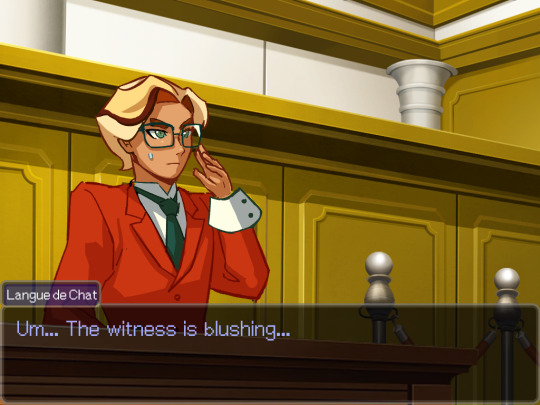
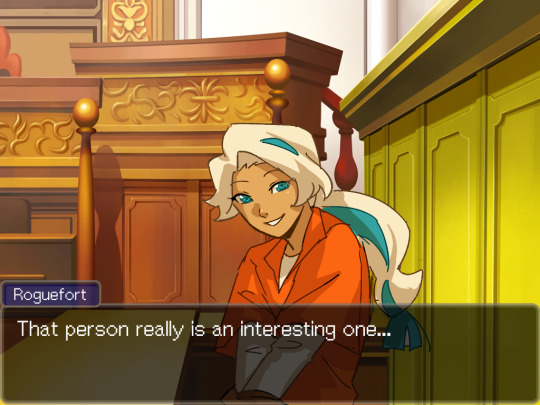


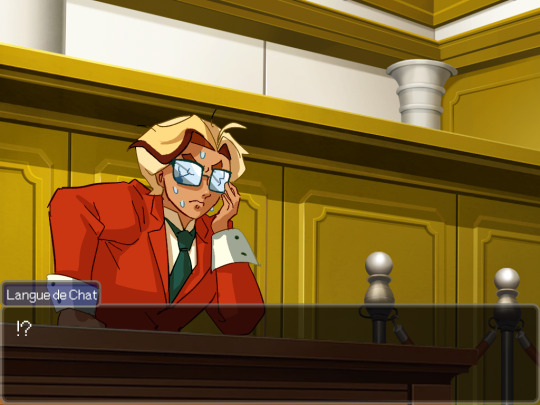
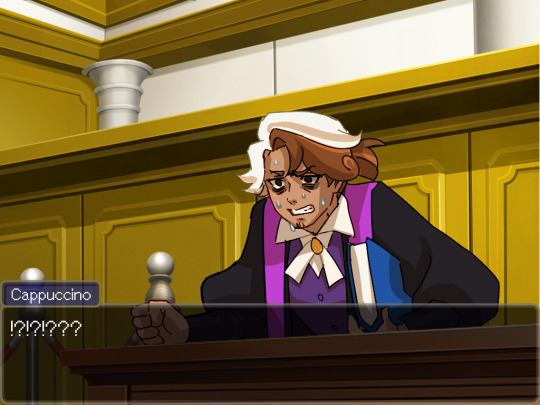
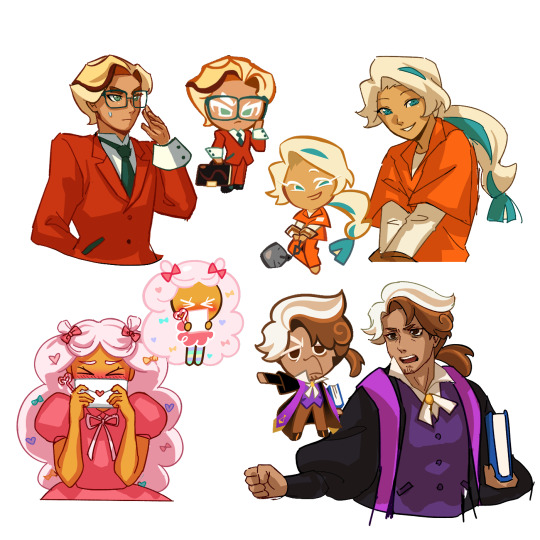
[Image Description: A series of digital redraws of the Cookie Run Ovenbreak characters from the Cookie Trial event in the Ace Attorney art style. The first image shows Cotton Candy Cookie standing in the witness stand, holding a love letter that covers her mouth. She's looking to the side and blushing. Her textbox reads "I'm here because the defendant stole something from me!".
The second image shows Langue de Chat cookie in the defence bench thinking "Um... The witness is blushing...". He is pushing up his glasses and has a drop of sweat on his face.
The third image is of Roguefort Cookie standing as the defence's co-council in a prison outfit, looking at the camera and smiling, saying "That person really is an interesting one..."
The fourth image shows Cappuccino Cookie standing in the prosecutor's bench, holding a book in his left arm and hitting the bench with his right fist, shouting "Tell us what they stole!"
The fifth image shows Cotton Candy Cookie again, this time blushing more, with her eyes closed and the letter covering her face even more and saying "That person..... Completely stole my heart!"
The sixth image shows Langue de Chat Cookie shocked, leaning on the bench and pushing up his now broken glasses, sweating and with messy hair. The textbox says "!?"
The seventh image is Cappuccino Cookie also shocked and sweating, leaning on the bench with his fist clenched and the textbox says "!?!?!???"
The last image shows a comparison between the redraws and the original cookie sprites. End ID]
I'm sorry everyone I gave in. I attorneyd the cookies
This was meant to be just some doodles but i was having wayyy too much fun with this lmao. The text is a bit awkward but there was a LOT of dialogue in the original and i had to cut it down somehow rip
Anyways I think Roguefort Cookie would be the worst defendant ever
*I'm very bad at writing and describing things so if anyone has any corrections to my ID please tell me thank you 😭
#im super proud of how cappuccino came out best old man ive ever drawn frfr#i love random ass fandom crossovers that only like 2 people are gonna care about#ace attorney#cookie run ovenbreak#crob#cookie run#cookie run fanart#crob fanart#ace attorney fanart#does this count as aa fanart??#i guess so#cappuccino cookie#langue de chat cookie#roguefort cookie#cotton candy cookie#art i'm proud of
3K notes
·
View notes
Note
Isagi is golden retriever behavior. Tell him to bakr he will do it. Tell him to kneel he will. He will protect you with his whole being even if he seems to be nice guy. He isn’t afraid to throw hand s
*ੈ🌩️‧₊˚— as close as strangers + yoichi isagi.

૮˶ᵕ ༝ᵕ˶ა synopsis — while at a bar with your sister, a stranger comes to your rescue and he’s not afraid to come to your defence.
⭑ warnings — please read + mdni ! characters aged up to 20s, fluff, strangers to lovers, meet cute, reader has a younger sister, weird men at bars (harassment kinda? but it’s minor), pro player!isagi, fem!reader - not beta read !
⭑ words — 1.4K.
⭑ notes — thank you nonnie for sending this in!! I got a little itty bit carried away but i hope you like it !! - m.list ✩

unironically, a bar can be one of the most dangerous places on earth. with its overpriced and watered down drinks, loud and disruptive patrons, and not to mention the countless number of men that can’t seem to take a hint. you find the sticky table tops gross and the peanut shells on the floor uncouth but you’re here for your little sister — who wanted no more than drinks and to catch up, filling you in on the details of her latest fling (who she’s sure is the one, despite it being the fifth time) since you returned to Japan.
you work a lot, you travelled abroad for college too so it’s been ages since you’ve last breathed the same air and walked underneath the same sky. you’d feel bad for missing this opportunity to meet someone important in her life while you still had it.
and you love your sister, so while she powders her nose in the bathroom as you both wait for her boy toy, you’ll put up with the stench of beer and the sleazy stranger arms length away from you who just can’t seem to get it through his head that you’re not interested.
“c’mon sweetheart, just one drink. lemme buy you a beer.” the stranger slurs over the top of his own beverage that threatens to spill into you as he encroaches on your personal space.
shaking your head politely, you lean away. “no thank you. i’m not to keen on beer.”
“then whas’ your drink of choice, cutie. let me know what i can get’cha.”
nothing. you refrain from rolling your eyes. nothing that he could afford. grabbing a handful of peanuts to distract yourself, you de-shell them with ease and chew on them to avoid speaking any further.
“no thank you.” you say plainly, reiterating yourself.
he still doesn’t seem to understand, cosying up to your side — his alcohol tainted breath cascading over the shell of your ear. “then let’s get out of here, i’ll get you somethin’ you can really enjoy.”
“i’m waiting on someone.”
“who? a boyfriend?”
“yes,” you lie as easy as breathing — you’re almost certain he wouldn’t leave you alone if he found out you were with your sister. “he’ll be here any minute.”
the stranger lets out a chuff, “i don’t see him, gorgeous girl—“
he reaches for your hand and it causes a wave of uncomfortable goosebumps to rise along your skin. you shudder, hold back a gag, and if only the bartender was closer you could signal for some form of help but you can’t bring yourself to move.
that is until a warm arm slips around your shoulders— and instead of being slimy and unsettling, the presence of this stranger behind you is comforting and safe. “there you are precious, sorry for being so late, i got caught up with work.” this man’s is smoothe like molten chocolate or rather honey running through your ears, and you find yourself enticed — leaning into him as if he’s a safety net.
you turn, only just, catching a glimpse of the stranger’s handsome side profile — his skin is golden, glowing as if it had been blessed by the god’s of the son. his eyes are a blue im a shade that you cannot match, it’s almost unreal to you. his hair his soft, his face calm and again, he feels so safe.
“i missed you,” you breathe the words into existence as if they’re natural, allowing a smile to overtake your features. “it’s okay.”
the dark haired man gives you a firm nod before looking over your head at the drunkard who had been bothering you. he offers a hand to him. “hi isagi… the boyfriend. do we have a problem, here?”
you recognise the name from somewhere but say nothing, letting isagi handle the situation from here.
“n-no sir! i-i’m so sorry i didn’t realise that—“
“good,” isagi’s voice lowers an octave, far less welcoming and kind than when he had initially addressed you as your fake boyfriend. “then next time you’ll take a hint and learn to leave women alone when they tell you no the first time. fucking creep.” he spits, squeezing you into his side protectively.
the stranger’s eyes blow wide and he lowers his head apologetically but you’re too focused on how flustered isagi’s whole act is making you feel. “a-again! i’m really sorry! i’m a huge fan i would never—“
“are you just that dense or do i have to repeat myself? scram.” isagi growls once more and does so until the man that had been bothering you flees the scene. within an instant, the tall dark and handsome man jumps away from you with an apologetic smile — and you embarrassingly admit to yourself how much you miss his embrace. “i am so sorry for touching you without asking. i-it’s just that i could see he was making you uncomfortable and no one else was jumping in so i just—“
turning around to face isagi fully, you shake your head and offer him your brightest grin. “it’s okay, if it hadn’t been for you i don’t know what would have happened. thank you…”
you pause to give him time and isagi trips over his words to give you his full name. “yoichi. yoichi isagi!”
you respond with your own name, trying not to dwell on the familiarity of his.
the pair of you spend the next few minutes chatting about everything and anything. you find out that yoichi likes soccer and has since he was a child. that he was an only child as well, travels a lot and has seen the whole world, though he thinks it gets a little lonely. you shyly admit that you feel the same — especially when work drags you across the globe and away from your family here in Japan.
the flow of your conversation is only interrupted by your little sister emerging from the bathroom excitedly, her nose effectively powdered as she waves an arm at you. “i see you’ve met isagi already!” she beams, sliding into the bar stool on your left while isagi takes your right.
“wait, you two know each other?” you squeak — how mortifying would it be that your younger sibling’s new boyfriend is the man you’ve been crushing on for all of fifteen minutes. “is he…the one?”
the duo share an amused look over the drinks that your new friend had ordered, your sister shaking you as if to snap you out of your trance of crazy. “god no! isagi is way too polite to be my type. my bachira is a little more adventurous!” she rambles, all love sick like. “no offence yoichi!”
“none taken,” he laughs before focusing all of his attention on you , making you squirm under the surface of his ocean blue eyes. “i’m just here for moral support. bachira was nervous about meeting you so i told him to take a lap around the parking lot to calm down before he came in.”
“wait bachira— as in meguru bachira? that one player from the blue lock team? i just styled him for my magazine in the US last month? that’s who you’re dating?” you ramble, eyes wide — which only seems to amuse isagi even more.
“uhuh, and this,” your sister grabs you by the shoulders and rotates you to face isagi, who’s cheeks flush red with nervousness. or shyness. “is yoichi isagi. blue lock’s heart and soul and your date for this evening. you’re welcome!” she sings.
“oh my god! i thought i recognised you! s-she used to have posters of you in our room back when bluelock was streaming!”
“you’re the one that used to kiss them!”
“you’re the one that’s dating his best friend!” you counter her stubbornly, but her attention is quickly stolen away by the world famous dribbler that slips through the doors — bachira’s own face lighting up when he spots her from across the room. your sister melts, running over and jumping into his arms. you can’t help but swoon, realising that whatever she has going on with bachira is obviously more serious than whatever chance at love she’d had before.
they look happy. you’re happy for her. “they’re cute together, aren’t they?” isagi mumbles, elbowing you gently with the wisps of a smile on his lips.
“oh yeah, big time.” you agree, taking a sip of your drink as you scoot closer to japan’s beloved striker. “you’re not mad that he swiped her from right beneath your feet?”
“nah,” yoichi responds simply, scooting closer to you as well. you let your gaze drift over from the happy couple to meet isagi’s fond one, looking down at you as if you’re the most precious thing in the world. “i’d rather have that kind of happy with the girl who was making out with my merch.”
you punch isagi in the shoulder out of embarrassment, and when his timbre laughter fills the room — you can’t help but think you’d want that happiness with him too.

#blue lock x reader#blue lock x you#bllk x reader#bllk x you#isagi x reader#isagi x you#isagi fluff#isagi yoichi x reader#isagi yoichi x you#blue lock fluff#yoichi isagi x reader#yoichi isagi x you#bllk fluff#yoichi isagi fluff#isagi yoichi fluff#isagi yoichi imagines#isagi imagines#bllk imagines#blue lock imagines#✧ ₊˚੭ — writing#tteokdoroki#✧ ₊˚✉️੭ — new notification#✧ ₊˚💬੭ — unknown messenger
1K notes
·
View notes
Text
"Buon Gussy," I say to a horrified crowd of onlookers who, no doubt, were hoping to see the Pope this morning. "It's me, the new Pope."
You might think that it's difficult to become the Pope. After all, there's like eight billion people on Earth and only one of them is the Pope. Well, except for the occasional time that between two and eighteen of them also claimed to be the Pope, but the Catholic Church has gotten really good at clearing up this kind of misconception over the years. True, it has historically been by murdering a lot of people, but the technique has evolved now that they can point at a Wikipedia page for "what the Pope looks like."
Anyway, I'm not going to get into how I became the Pope. Lots of bureaucratic nonsense, diplomatic hoo-ha, very poor bet at the crooked casino that me and my uncle run just far enough away from the Italian borders to be legally in international water. Point is, I was il Papa now, and I was going to il Papa as much as I could before the security guards in cool outfits protecting me got tired of my incredibly abrasive personality and slipped a shiv in my ribs.
"Bring me some cars to bless," I shouted at an orderly who might have been an archbishop or something. I'm not big on hierarchy, but what I am big on is exotic, large-engined grand-touring cars that I don't have to pay for. Within minutes, they pulled up a brand new Ferrari. This would be a great "get" for their public relations department, whispered the crooked vicar who secretly plotted to steal my giant hat.
Friends: I made a big ol' fucking burnout right then and there, until the cobblestones of Rome finally debeaded the rear tires. Shredded rubber and cords were tossed into the faithful crowd by the better part of 600 horsepower. It was such a great morning, that I felt bad about the enormous holy war that I accidentally kicked off a few minutes later.
In my defence, I don't speak a lot of Latin, and I thought my crooked vicar was asking if I wanted to go get some beers. Turns out the Latin for "beers" is not "de violentiam internationalis expeditionem." That's on me. Go easy – it's my first day.
137 notes
·
View notes
Text
Ramblings on "Eight Little Talons"
The Talons
One of the most interesting things about the Tevinter Nights story, “Eight Little Talons”, is how it portrays the relationship between all the different Talons.
The very first paragraph features Viago reflecting on how important decorum was, because he does not want to be shown up by the others. He then goes onto think about how unusual it is to have such a gathering of Talons, and that they will need to put aside their differences if they want to accomplish their goal of a united front against the Qunari invasion. The quote, “while all Talons were peers, the same could not be said about their resources and influence,” paints a picture of how even though they are all individually powerful, yes, there is still the ladder of supremacy based on First Talon to Eighth Talon. As such, they are all stuck playing a game against each other to keep or advance their positions on that ladder. Additionally, Dante refers to a competition that exists between the north and south of Antiva.
This is, ultimately, their downfall. It’s what Emil claims motivated him to take them out. He admires the noble origins of the Antivan Crows, and dislikes what they’ve become. He tells Teia, “Now, it’s all about family. Blood. Instead of a claw working as one, we fight over scraps. Eventually, we’ll all starve.” And in the end, he says, “It’s always money with all of us. That’s the problem. In the beginning, we were protectors. We fought for Antiva—for the people. Then somewhere along the way we chose profit over patriotism.”
Viago de Riva
I love how Viago proficiency with poison is both a blessing and a curse for him. On one hand, it makes him very good at his job. But on the other, he is profoundly paranoid about being poisoned himself. He has memorized how different ingredients react and can be hidden in different foods, and refuses to consume anything handed to him without either testing it first or preparing antidotes. He dresses to show the least amount of skin possible, and is anxious over any form of contact with another person. He takes a daily micro-dose of Adder’s Kiss to develop an immunity to it.
Another interesting thing about Viago, is how bitter he is about being a bastard son of the Antivan King. When Teia wonders about his past, she knows better than to actually ask him any questions. Viago was only given two choices in life because of the circumstances of his birth: either live in luxurious exile, or join the Crows. He resents all his half-siblings who chose the first, and he resents the king himself. Viago may be more powerful than them all, even the king, but he is now stuck in this life. Had he not been, he thinks he could been a better ruler of Antiva.
While Viago is certainly skilled – he firmly believes he could kill every Talon at the summit if he wanted to - it’s easy to infer that it was nepotism that earned his rank, or at least that’s the reputation he has, based on the comment from Dante: “Your daddy will protect you”.
Viago sees himself as a recluse. Teia says his reputation is that of a curmudgeon, and in her defence, he himself says he doesn’t care about being liked, he just wants to be respected and feared. I think the fact that he was raised in a “gilded cage” with a mother whom he remembers only for her wine-stained teeth had a lot of influence on this. He’s been alone all his life.
Andarateia “Teia” Cantori
Just like Viago, Teia has an unconventional speciality as well. While Viago observes that she weaponized her beauty, I would propose that Teia’s real mastery is manipulation. Using her beauty is certainly part of that, but in examining the way she responds to each and every character differently shows that she is playing a far subtler game. She shoehorns Viago into riding with her in a gondola, so that the others will gossip about how their houses must be in an alliance – the goal being to give them more power in the discussions. She calls Caterina “Nonna”, which Caterina points out that not even her actual grandchildren do, as a way of disarming the First Talon. And when she interrogates Dante, yes the serum he’s under helps, but it’s her cunning persuasiveness that does the leg work.
Viago remarks that at twenty-eight years old, Teia is the youngest Talon in history. Perhaps this is a contributing factor to why she has a different perspective than the others, when it comes to her dislike of “the bottom line” – the obsession with making coin for their kills. She also has her own set of rules the others do not follow; for example, she refuses to kill servants unless absolutely necessary. And she displays the ability to sympathize with people in a way that the other Talons do not. So you could call it naivety, sure. But I believe it’s more to do with just the type of person she is. We know from Zevran how the Crows work hard to burn out everything except murder in their recruits, but the fact that Teia holds onto her compassion speaks of how strong it is.
It’s also worth mentioning that Teia had to accomplish a hell of a lot to get where she is. “An elf born in an alley with no family or connections, Teia and her rise to power had caused quite the controversy. The Antivan Crows always told new recruits that anyone could become a Talon, but it rarely happened.” She tells Viago that she does not let where she comes from define her, nor is she ashamed of who she is. I love that. I love how unapologetic Teia is about herself.
#dragon age#tevinter nights#eight little talons#viago de riva#andarateia cantori#teia cantori#antivan crows#meta#have i mentioned i'm still obsessed with this story
104 notes
·
View notes
Text
So, in honour of finding a whole bunch of people who understand how appalling it is to use 'punah' in a sentence, I thought I'd open up membership of the ASAAD Brigade (A South Asian Armand Defence Brigage) to people beyond @quark4561.
We've been DMing nonstop about our headcanons and AUs and theories, and there are also long reply threads in the comments to various posts we've made. I might try to consolidate everything at some point, and add it to this post.
But till then, hi @rhaenyra-first-of-her-name @claudia-de-lioncourt @antiquititties @hozierplaying @shesgayfolks!
(And anyone else who feels like commenting! Like I said in a reply, a lot of us are just stealthing along armanding until its time to don our arun hats to play detective.)
To stick to the theme of beautiful gay Assad in period clothes being underserved by white showmakers, here's a supercut of all his scenes in what I have been told is a terrible British drama called Hotel Portofino. Where he is a Bengali named Anish Sengupta, whom everyone inexplicably calls 'Nish'. Yes, with the chhoti 'ee' ki maatra. Every white person needs to understand that vowels actually are precise in other languages. Enjoi.
youtube
#the asaad brigade#my meta#interview with the vampire#assad zaman#hotel portofino#are there group DMs on this website even#how do we chat#feeling like RWA uncle about to post suprabhatam to colony whatsapp group#Youtube
53 notes
·
View notes
Text
Susan Hawthorne’s In Defence of Separatism includes a chapter analysing the seven ‘forms of power’ identified by de Crespigny, insofar as they are represented in men’s power over women. I found this really interesting, and worth sharing, though there’s too much text to share the whole thing in a post. So I’m going to try and summarise her points here - but please bear in mind I am not a philosophy scholar, far from it, and this may be inaccurate or contain misinterpretation as a result. I’m going to try my best.
So, the seven forms of power according to de Crespigny, 1970:
Coercive power
Inducive power
Reactional power
Impedimental power
Legitimate power
Attrahent power
Persuasive power
Hawthorne analyses these as follows:
Coercive power: Someone using or threatening to use his power, in order to make someone else comply with his wishes. This could mean using physical force, or deprivation of access to resources. The example Hawthorne gives is domestic violence (using power), and victims’ reluctance to reveal domestic violence for fear of further attack (consequence of the threat of power). She adds that every time the powerful individual wields this power successfully, it empowers him and disempowers his victim.
Inducive power: Someone complying with a powerful person’s wishes because she believes she will benefit by complying. This benefit could be a reward, or the withdrawal of a threat/deprivation. This benefit may or may not materialise. Hawthorne gives the example of marriage, for security and social benefits. She argues that even if this is perceived as a choice, it’s not a free choice, so the complying individual’s autonomy is impaired and they lose power.
Reactional power: Someone complying with a powerful person/institution because of her beliefs about that person/institution, particularly when she refrains from doing what she would have done otherwise. One of the examples Hawthorne gives is someone refraining from behaving as she wishes at work, because she believes this would prevent her from getting a promotion.
Impedimental power: When a powerful person/institution puts obstacles or impediments in the way of a less powerful person. Hawthorne extends the example above - when the woman is in fact not promoted as a result of her behaviour, or due to discrimination against women generally.
Legitimate power: The ‘right’ to command and be obeyed. This is the power of law and government. Even if the powerless individual disagrees with the powerful individual/institution, she obeys because she believes their power is legitimate. The example Hawthorne gives is the woman successfully suing her employer for discrimination, where the power is in the hands of the law/court, and should be obeyed by the employer.
Attrahent power: Power resulting from wanting to be like, or be liked by, a more powerful individual. Hawthorne gives the example of a person complying with the wishes of someone she loves, just because she loves him. She notes this isn’t always a destructive or conflict-inducing form of power.
Persuasive power: This is split into rational persuasive power - where someone gives information and reasonable arguments to persuade someone else to comply with their wishes - and non-rational persuasive power - where someone gives misinformation, deception, or emotive arguments to persuade someone else to comply. Hawthorne gives the example of safe and accurate contraceptive education for the former, and dangerous advice to induce miscarriage for the latter.
I’ve found it interesting, since reading this book, to consider where and how the various forms of power appear in my life, so I thought it was worth sharing them in case others found this interesting too. Please feel free to add examples, or if any of you are more informed and would like to explain further/better or correct this please go ahead.
128 notes
·
View notes
Text
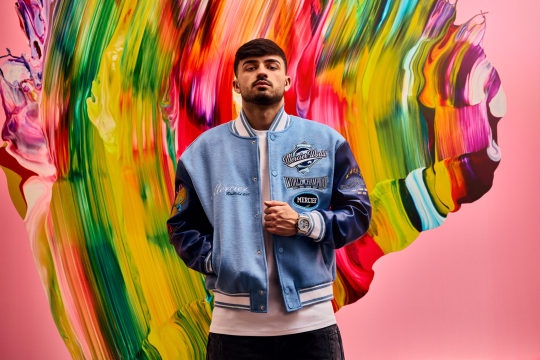
PEDRI in Collaboration with AUDEMARS PIGUET - BARCELONAS GOLDEN BOY
Similarly, Pedri grew up in the mountainous municipality of Tegueste in the Canary Islands, surrounded by natural beauty. Spending hours near the sea playing football with his brother and friends, he has experienced the joys of the planet and its beauty before entering a life of football, fashion and bright lights. But a profound sense of where he has come from remains, and humility and humbleness continue to lead the 21-year-old’s choices.
His recent collaboration with Platano De Canarias, an institutional brand fighting malnutrition through the promotion of bananas, is a testament to that. The banana is the most important crop in the Canary Islands and for decades, the industry has been the protagonist of the economic growth of the archipelago – accounting for 60% of Europe’s banana production. He is also an ambassador for Kick Out Plastic, a non-profit international campaign fighting for a world free of plastic pollution and climate change.
“Climate change is something that affects us all and should concern us all, especially young people,” Pedri explains. “Sustainability and recycling are part of my daily life because my parents instilled it in me since I was a child. Being from a natural paradise like the Canary Islands, which also lives mainly from tourism, I am very aware of the importance of taking care of nature for all of us.”
As a 21-year-old with over 13 million followers on Instagram, you might not expect such issues to be on Pedri’s radar. Yet he is acutely aware that he not only has the world at his feet but in his hands — a gift he has no intention of wasting.
Intelligent, humble, and grounded, Pedri represents the younger generation with flying colours. He is a role model to all those who find themselves lucky enough to share his position and an indication that the high-profile figures at the forefront of modern football might just have deeper purposes.
On the pitch, Pedri has been hailed like no other — ‘One of the world’s best’ in the opinion of Barcelona’s manager Xavi Hernández, and ‘The signing of the decade’ according to Marca, Spain’s leading sports news outlet.
Lionel Messi’s final campaign in the famous red and blue hoops of Barça didn’t quite live up to expectations but offered an exciting window into what could be. Pedri was fresh on the scene; quiet, innocent, slight in figure and polite in persona; terrorising defences with a low centre of gravity, immense skill, close control and vision. His personality and playing style drew obvious comparisons to the iconic Argentine with whom he had struck up quite the partnership on the field. By all accounts, Barça’s next messiah was born.
But the story of a wunderkind is rarely so simple. Following his move to Barcelona and The Kopa Trophy win, he played a staggering 73 games and over 4,000 minutes in less than a year and subsequently suffered a string of injuries that would leave him out of the side for months at a time. While he has since returned to the team and reasserted his peerless playmaking form, the issue of over-played, over-pressured, fatigued young players falling victim to a demanding fixture schedule remains a pressing problem with the modern game.
“Professional football is very, very demanding, not only physically but mentally too,” Pedri admits. “I try to face things professionally and prepare myself to always be in optimal condition. That’s why it’s even more annoying when an injury forces you to stop and start all over again.
“In difficult moments, my brother Fer — the person I love the most in this life — is the one who protects me and is always by my side. I like to spend my days off at home with him and my family, watching TV series, playing board games and enjoying their company.
At first glance, Pedri appears to be an ordinary young man, but one who is poised on the brink of greatness. As the bricks for the new Camp Nou are laid one by one, Pedri is quietly constructing his own empire, drawing support from family, friends, and his sheer love for football.
“I am who I am because of my parents,” says Pedri. “They raised me with very clear values: you must be humble and respect everyone. I live my life by a quote from the legend Johan Cruyff, ‘Salid y disfrutad’ which means to ‘go out and enjoy’, and I think that sums up my approach to life.”

83 notes
·
View notes
Note
I would love to hear more of your thoughts on House & its relation to the detective genre ! I think that house (completely accidentally and very badly) stumbles into a good critique of how doctors & medical structures view addicts & disabled people, with house being a horrible hegemonic mr malpractice to his patients frequently yet half is series is unironically just about all the injustice/mistreatment he faces because his doctor colleagues can’t see him as a person but only as a problem to be solved/rehabbed/therapized/institutionalized/treated like a child with stolen candy/treated like a criminal. and then it also randomly takes an incredibly pro MAID stance. which isn’t really part of this but I just remembered how batshit insane that show was. and then chase killed a dictator and I feel like the show was squarely on his side for that one. Anyway. Do you have thoughts? I really like house.
ok here's my house md take. like a lot of medical dramas, the show essentially relies for its dramatic appeal on the construal of patients as gross, weird, and stupid—rubes who are too uneducated and self-serving in their petty lies to solve their own bodies, and thus need the intervention of house to fix them. this is standard for the genre, although slightly meaner on house than on some other examples (cf. grey's or even the older and soapier generation of these shows). i don't even think house committing malpractice is all that new; it's relatively common as a plot point that positions the noble rule-breaking doctor as someone who 'does what needs to be done' and skirts the bureaucratic red tape to follow their own superior judgment. what makes house more interesting is that from the get-go, house himself is both a doctor and an unwilling patient. in itself this isn't a tension that's new to the medical soap (injuring a major character is pretty par for the course) but house's particular interactions with the ruling biomedical epistemology are, as you point out, characterised by hostility and resistance, and the show frequently either sides with house, or at least leaves it somewhat up to the viewer to decide whether house is right to resist the pathologisation that cuddy and wilson try to impose on him.
this is kind of a tricky line to walk for 7 seasons or however long the show is. my recollection is there are episodes, for example, where it's very clear that house's pain is physical, and the writers use this to morally justify his vicodin use. this is obviously not a full-throated defence of opioid users, but it is at least pointing to a position on chronic pain that allows for the possibility that for some people, long-term use of drugs with a high addiction potential and side effects is legitimately the best thing. but, this messaging is also undercut by the fact that it's primetime television, they need to make drama, and there are definitely also episodes where house is framed as potentially lying about his pain, or at least mistaking a somatic problem for a physical one, which the writers often (not always, but often) present as evidence that actually, house shouldn't be trusted to make his own decisions about drug use, and ideally should be 'de-toxed' and probably sent to cbt or whatever. of course all of these considerations are also contextualised by the fact that house is, again, not just a patient but a doctor: his right and ability to make these types of calls for himself is, it's suggested, a result of his having attained medical education and credentials. the patients who come to be treated by him are seldom, if ever, given this same level of consideration or presumed to have sufficient self-awareness to make their own medical decisions. this isn't to say they're portrayed entirely unsympathetically, but ultimately the narrative engine of the show relies on house being the smartest guy in the room (though ofc, sometimes tragically 'held back by his addiction').
so, although there are moments on the show that genuinely transgress some of the norms of the med-drama genre, i have never agreed with people who thought that the show as a whole was presenting any sustained critique of the medical system, the treatment of chronic pain/disability, or the power-imbalanced doctor-patient relationship. ultimately all authority on house md is supposed to emanate from the physician, or the physician's superiors (cuddy as a 'check' on house, though sometimes a failed one! again because of the need to generate drama for like 140 episodes), and at its most radical the show is really only capable of presenting house himself as an out-of-control aberration whose existence strains the existing system rather than being produced by it.
this is where i think the comparison to the cop show genre becomes more clarifying. house md never made a secret of being an interpolation of the detective genre, specifically sherlock holmes. however, i'm not sure i've ever really seen writing on the show that analyses what effect this actually has on house. like police, doctors are tasked with maintaining certain social norms; the dichotomy between policing and medicine isn't even a solid line, as criminality is frequently rhetorically construed as a pathology in itself and medical authorities can and do have recourse to carceral systems in order to discipline and confine recalcitrant patients, the 'criminally insane', addicts, and so forth. (policing has historically also been understood in a more expansive sense than how we use the word today; our understanding of the medical/public health system as separate from police authority is arguably more to do with university credentialling than the actual exercise of social and political power).
so, if we want to be serious about the portrayal of medicine in popular culture (i am always serious about this) then we're necessarily talking about broader systems of power, social control, and discipline, and doubly so on a show like house that is explicitly inspired by detective fiction. this is where house md is most ideologically objectionable to me: as with the trope of the cop who breaks all the rules, house is basically positioned in one of two ways throughout the show. either he's a lone genius who alone is willing to achieve noble ends (cure) through distasteful means (breaking into patients' homes, berating them, performing risky interventions on them, &c), or—and this is rarer on house but does happen—he's portrayed as genuinely crossing an ethical line, in which case he's a kind of monstrous aberration from the normal, ethical functioning of the medical system, often represented metonymously by the objections that cuddy, wilson, or house's underlings raise. in both of these cases, as with copaganda, the function is ultimately to reinforce the idea that doctors, though occasionally capable of human error, are prima facie wiser than their patients, looking out for their patients' best interests, and performing noble social roles as healers. house, ofc, is very rarely willing to admit that he has any underlying ethical motivations, though much of the show is driven by the flashes where he is revealed to 'secretly' care about another person (often wilson) and anyway, the construction of an ethical society in which all individual actors are motivated solely by selfish interests is a very established rhetorical move for those interested in defending liberal capitalist societies (cf. charles darwin, thomas malthus, adam smith, &c).
because of television's need to generate profit via audience engagement, house md always relied on a certain level of shock or at least provocation in order to sustain itself. so, there are certain aberrations from the more overtly doctor-valorising medical dramas, like the suggestion (sometimes tongue-in-cheek) that house was better at his job when he was mildly high on opioids. this was, for the reasons outlined above, never a serious entry into political critique, but it was at least refreshing in a certain way as a departure from, eg, the portrayal of addiction and drug use that we see on grey's, which is completely limited to the medicalised AA narrative of 'recovery' as a battle against the malevolent intervention of an external chemical agent. which is to say that although house md is ultimately reactionary in the way we should expect from an american tv show, it did at least dabble in a certain level of caustic iconoclasm that allowed limited departures from the genre conventions. even with what was ultimately a pretty solid vindication of the anti-opioid narrative, the show does stand out in my mind as one of the few very popular presentations of any kind of alternative stance on chronic drug use. that it's usually put in house's own mouth means it is occasionally legitimated by his epistemological authority as a physician, though ofc ultimately this authority is challenged not through a critique of the medical system, but by presenting house as individually and aberrantly licentious, undisciplined, and insane—and his chronic pain/disability are both a justification for this, and a shorthand for conveying it.
175 notes
·
View notes
Text
I forgive myself for my impulse to call for the ousting of the Healthy White & Propertied Male from the throne of the universal subject position that he’s sat in for so long. The direction to go, we are conditioned to believe, is up. Like birds trapped in a room.
But it’s the throne itself that we must tear down: the throne on which the universal sits. That there is a throne at all is the problem—regardless of who sits in it. We don’t need to go up. Let’s look to the windows, the way out.
Johanna Hedva, "In Defence of De-persons"
149 notes
·
View notes
Text
Taking Gryffindors and Their Stans to Court
So I thought it would be fun to compile a list of crimes committed by various Gryffindor characters, especially the ones I have seen stans blatantly glorify or condone. This is also fueled by the narrative ignoring how horrific these actions are as well. For each, I will provide the definition of the crime as listed in British law (hyperlink provided in the crime category), cite the guilty parties and cite some of the flimsy defences provided by stans. The characters include, but are not limited to:
Hermione Granger
Weasley twins
Marauders (especially James Potter and Sirius Black)
Rubeus Hagrid
Professor McGonagall
This post will be a work in progress so I will add as I go along. Please feel free to add as well. Also, I am not a legal expert so do not expect these categories to be 100% accurate despite my doing my best. Here I go!
Crime: Sexual Harassment
The Equality Act 2010 says someone sexually harasses another person if they:
Engage in unwanted conduct of a sexual nature and
The conduct has the purpose or effect of either violating the other person’s dignity or creating an intimidating, hostile, degrading, humiliating or offensive environment for them.
Guilty parties: James Potter and other marauders as accomplices (Snape's Worst Memory, Book 5)
But too late; Snape had directed his wand straight at James; there was a flash of light and a gash appeared on the side of James’s face, spattering his robes with blood. James whirled about: a second flash of light later, Snape was hanging upside-down in the air, his robes falling over his head to reveal skinny, pallid legs and a pair of greying underpants.
Many people in the small crowd cheered; Sirius, James and Wormtail roared with laughter.
There was another flash of light, and Snape was once again hanging upside-down in the air.
‘Who wants to see me take off Snivelly’s pants?’
Said by Marauder/James stans:
Snape was a future DE so he deserved it; ie. future criminals/bullies deserve to be bullied before they commit said crime. Someone had to bully Snape.
What James did was not sexual harassment
Snape is a guy so he can't be sexually harassed
I hate Snape so I love seeing him hurt and in pain (perfectly valid reason, we can hate who we want. still listing it though)
Boys will be boys. The marauders are just teenage boys joking around.
In that period, what James did was not illegal
Snape called Lily a mudblood so he deserved it
Snape attacked James so he deserved it
Crime: Kidnapping
The legal definition of kidnapping is to take someone unwillingly and then keep them illegally imprisoned without their valid consent. The latter is normally done with motive, such as financial gain in the form of a ransom.
Guilty parties: Hermione Granger (The Beginning, Book 4)
‘Oh, not electronic bugs,’ said Hermione. ‘No, you see … Rita Skeeter’ – Hermione’s voice trembled with quiet triumph – ‘is an unregistered Animagus. She can turn –’
Hermione pulled a small sealed glass jar out of her bag.
‘– into a beetle.’
Said by Hermione stans:
Rita deserved it for being a sleazy journalist and saying mean things about her and her friends
Rita deserved it by committing a crime first as an illegal animagus. So she has no leverage against Hermione.
Crime: Child Cruelty (Or Child Endangerment/Abuse)
The offence in section 1 of the 1933 Act is committed where a person over the age of 16, who has responsibility for a child under that age, wilfully assaults, illtreats, neglects, abandons, or exposes that child in a manner likely to cause ‘unnecessary suffering or injury to health including any mental derangement’.
Guilty parties: Prof Minerva McGonagall (Snape’s Grudge, Book 3)
Professor McGonagall was so furious with him she had banned him from all future Hogsmeade visits, given him a detention and forbidden anyone to give him the password into the Tower. Poor Neville was forced to wait outside the common room every night for somebody to let him in . . .
Context: An alleged mass murderer (Sirius Black) was on the loose 🫠
Said by McGonagall stans:
She's just strict
Crime: Assault
An assault is any act (and not mere omission to act) by which a person intentionally or recklessly causes another to suffer or apprehend immediate unlawful violence.
Guilty parties:
Rubeus Hagrid (The Keeper of the Keys, Book 1)
He brought the umbrella swishing down through the air to point at Dudley — there was a flash of violet light, a sound like a firecracker, a sharp squeal and next second, Dudley was dancing on the spot with his hands clasped over his fat bottom, howling in pain. When he turned his back on them, Harry saw a curly pig’s tail poking through a hole in his trousers.
...
‘Oh, well — I was at Hogwarts meself but I — er — got expelled, ter tell yeh the truth. In me third year. They snapped me wand in half an’ everything.’
Fred & George Weasley (Back to the Burrow, Book 4 & Snape's Worst Memory, Grawp;Book 5) - two for the price of one lol
Dudley was no longer standing behind his parents. He was kneeling beside the coffee table, and he was gagging and spluttering on a foot-long, purple, slimy thing that was protruding from his mouth. One bewildered second later, Harry realised that the foot-long thing was Dudley’s tongue — and that a brightly coloured toffee-wrapper lay on the floor before him.
‘Yeah, Montague tried to do us during break,’ said George.
‘What do you mean, “tried”?’ said Ron quickly.
‘He never managed to get all the words out,’ said Fred, ‘due to the fact that we forced him head-first into that Vanishing Cabinet on the first floor.’
‘Not until Montague reappears, and that could take weeks, I dunno where we sent him,’ said Fred coolly. ‘Anyway … we’ve decided we don’t care about getting into trouble any more.’
To cap matters, Montague had still not recovered from his sojourn in the toilet; he remained confused and disorientated and his parents were to be observed one Tuesday morning striding up the front drive, looking extremely angry.
Hermione Granger (Felix Felicis, Book 6)
‘Oppugno!’ came a shriek from the doorway.
Harry spun round to see Hermione pointing her wand at Ron, her expression wild: the little flock of birds was speeding like a hail of fat golden bullets towards Ron, who yelped and covered his face with his hands, but the birds attacked, pecking and clawing at every bit of flesh they could reach.
Said by Hagrid stans:
Like with Minerva, I don't see Hagrid stans or regular fans bringing this up. But crimes against the Dursleys are usually justified by the fandom due to their being abusive to Harry.
Said by Weasley twins stans:
The Dursleys were abusive to Harry so Dudley deserved it.
Dudley brought it on himself by eating it. The twins did not force him to eat it.
It was just a joke - harmless fun (for both crimes)
They did not know what the cabinet would do
They did not intend to almost kill Montague
Montague deserved it because HE WAS TAKING HOUSE POINTS (***INSERT RAGE!!!!***)
The twins are just mischievous. They are so funny!
Said by Hermione/Romione stans:
It was just a mistake
Hermione has anger issues. She's just a teenage girl.
Hermione was distraught. She didn't mean it.
Ron deserved it for hurting queen Hermione.
Ron doesn't care so why do you?
Romione is the best HP ship ever. All ships have rough patches.
No matter what Hermione does, I will always ship her with Ron. The other options are not good for her.
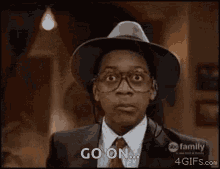
I will pause here because I can feel my blood pressure rising. I don't really have beef with anyone, I just don't like seeing these takes on my dash or these responses on my anti blog posts. I have no control over people's opinions and I doubt more than a handful of people care about mine.
Will continue next time on Taking Gryffindors and Their Stans to Court!
PS. All attempts to deflect by pointing the finger at other characters like Draco Malfoy, DEs, Severus Snape etc will be ignored. This is about JKR's darlings who apparently can do no wrong and the stans who shamelessly justify violence.
#anti gryffindor#anti gryffindor stans#anti james potter#anti marauders#anti hermione granger#anti minerva mcgonagall#anti professor mcgonagall#anti hagrid#anti rubeus hagrid#anti weasley twins#anti fred weasley#anti george weasley#uk law#harry potter books#harry potter series#harry potter and the philosopher's stone#harry potter and the goblet of fire#harry potter and the order of the phoenix#harry potter and the prisoner of azkaban#dudley dursley#severus snape#snape deserved better#slytherins deserved better#dudley deserved better#even kid bullies don't deserve to be terrorized like dudley#rita skeeter#graham montague#Taking Gryffindors and Their Stans to Court#anti romione#ron weasley deserved better
75 notes
·
View notes
Text
This is a post about a part of s3 I've been struggling to put into words, but oh well, let's try anyhow:
I think, if it had been anyone else's season other than Polin's, and if anyone else had been Whistledown, Cressida could have had a proper redemption arc.
When we first learned she would get a sort of redemption arc this season, I expected Cressida and Penelope to have at least one proper conversion. It would be odd to have Penelope's bully get a happy ending in her season without them at least talk it out, right? Well...
The thing about her journey this season is that her redemption was about trying to be less of a mean girl, but never to amend for the bullying she's done before. Her behaviour was explained by her terrible home life, but we do not get the feeling she regrets it, Eloise calls her out and she's like oh well, guess I will stop now, and that is it, because it was a means to an end, that's how she's been raised to be.
I've seen people wonder why Eloise didn't give her some money to escape and to that I say: which money? She's a Bridgerton, but she's also a woman, she does not have any money to her name, she would need to ask Benedict and as close they are, I doubt Benedict would just accept to do that, or she would need to ask Colin and he hates Cressida because of the way she's always treated Penelope. It's an endless circle, even Violet did not really approve of their friendship, even if she didn't meddle to avoid a repeat of last season. Cressida's behaviour led to people turning her back on her. However, Eloise knew Cressida's struggles, knew the fate that awaited her if she had just sat back and done nothing, and she turns her back on her so quickly? It was a bit jarring I admit but in Eloise's defence, I think her main gripe is that Cressida is blatantly lying and taking credits for someone else's work, this line stood out the most:

That scene is also a direct parallel to Eloise and Penelope's fight as Cressida regresses and lashes out, the difference being here, Eloise admits she's been envious of Whistledown. Something she could not admit last season, but now can after a year trying to fit in society and being miserable in it. Furthermore, now that the Queen thinks Cressida is Whistledown, Eloise sees this as her way out to secure her family's safety and her brother's happiness without breaking his heart, she's the one who suggests that Penelope just give it up, let Cressida take the name, so no one has to be hurt more, while Penelope is the one who still wanted to tell Colin.
But back to the topic at hand. If anyone else had been Whistledown, I feel like Cressida would have thought that she could have appealed to her emotions, perhaps manipulate her. Whistledown is power indeed, they all knew that, and she knew if anyone could help restore her reputation, it is the real deal. But then she finds out Penelope is behind the column, and there's still unresolved tension between them because they never talked and they were in competition for Debling not so long ago. Penelope also just married a Bridgerton, whose name Cressida just tried to slander in her fake column (granted, because of Lady Cowper's influence). Cressida has no one else in her corner, the clock is ticking, and she definitely doesn't think Penelope would help willingly (although I personally think she would have eventually, as Penelope's been grappling with the damage she's done herself as Whistledown, and in anonymity. After all that season, she was trying to change her column, and use it to uplift the other debutantes), so Cressida resorts to blackmailing instead.
This brings more drama, and I think that's why her arc was doomed from the start - the writers never made her feel remorse for the bullying, and Penelope never learns of her reasons (not that it would mean she'd need to forgive her for the bullying anyway). I personally think it was compelling, that you could understand her actions and her desperation, but she kept making worse decisions despite the choices offered to her. And again, she kind of parallels Penelope in that way, and the big difference by the end of s3 is that Penelope had the support of her family who listened and understood her once she had the confidence to stand up to them but Cressida was alone.
I originally did not care much for her character, and I'm still mostly neutral about her. She is a young woman put in an impossible position and if they ever bring her back, I hope she can find her own peace and properly grow from her mean girl persona, but I doubt she can find that near the Bridgertons now.
#bridgerton#bridgerton spoilers#bridgerton thoughts#cressida cowper#eloise bridgerton#penelope featherington#star.txt
39 notes
·
View notes
Text
in defence of Noah Temel* (Folge 1053 - 1055)
*weil Colin nicht verteidigt werden muss; er macht keine Fehler und wir alle lieben ihn <3
Eine Bemerkung vorab: Ich gehe in dieser Argumentation davon aus, dass Noah sich seiner Gefühle für Colin bewusst ist und weiß, dass diese Gefühle über Freundschaft hinaus gehen.
Andere Interpretationen der Situation (z.B. diese) finde ich jedoch auch sehr interessant und plausibel, und zum Großteil würde meine folgende Analyse von Noahs Verhalten ebenso auf diese anderen Möglichkeiten zutreffen; man müsste nur die Begründungen demnach anpassen.
Ansonsten lest euch bitte auch alle die Analyse zu Noahs Charakter und Verhalten von June durch, falls ihr es noch nicht getan habt! Sie hat das ganze wirklich toll zusammengefasst und ich möchte nichts von dem widersprechen; eher noch ein paar Gedanken ergänzen.
Recap:
„Ich kann das alles nicht. Befreundet sein. Weißt du, der Kuss hat mir echt was bedeutet. Ich hab‘ sowas noch nie für irgendjemanden gefühlt. Und ich will nicht so tun, als wäre da nichts. Ich wollt‘ nur, dass du das weißt.“
[Abgang Colin]
So verlassen wir Noah und Colin am Ende von Staffel 26.
Wir, als Zuschauer:innen, wissen zu diesem Zeitpunkt also:
Colin ist in Noah verliebt, er ist sich seiner Gefühle bewusst und hat Noah seine Gefühle gestanden.
Noah ist in Colin verliebt, er ist sich seiner Gefühle (wahrscheinlich) bewusst, aber möchte diesen aus persönlichen Erfahrungen und Ängsten nicht nachgehen und lehnt Colin deshalb ab.
Colin glaubt aber, dass Noah auch etwas fühlen muss und kann deshalb nicht nur mit ihm befreundet sein.
Hier könnte die Geschichte zu Ende sein, denn…
… das Problem zwischen Colin und Noah ist offensichtlich nicht, wer in wen verliebt ist oder wer es nicht ist.
… das Problem ist genauso wenig, ob sie sich selbst und dem anderen gegenüber die Gefühle (ein-)gestehen können. (Denn auch wenn Noah es bisher nie direkt ausgesprochen hat, so schwingt in mehreren seiner Aussagen bereits ein unterliegendes Geständnis mit und Colin ist sich sicher, dass Noah auch etwas für ihn empfindet).
Wir haben also zwei Personen, die ineinander verliebt sind und voneinander wissen, dass sie ineinander verliebt sind.
Die Grundlage des Problems ist, dass Noah und Colin zu diesem Zeitpunkt unterschiedliche Dinge in ihrem Leben und somit in der anderen Person suchen. Colin sucht Liebe, während Noah den Halt und die Unterstützung eines guten Freundes braucht; Gefühle hin oder her.
Es besteht also eine Art Interessenkonflikt (und so sehr wir Noah und Colin natürlich zusammen sehen wollen und hoffen, dass Noah seinen Schatten irgendwann überspringen kann), beide haben zurecht ihre Grenzen gesetzt und müssten damit leben können
- tun sie aber nicht.
Staffel 27:
Zu dem gerade angesprochenen Interessenkonflikt aus Staffel 26 kommt mit Beginn des neuen Schuljahres ein neuer Konflikt hinzu:
Wie kommunizieren Colin und Noah? Und vor allem: Wie interpretieren die beiden die Worte des anderen?
Wir erfahren in der Trust-Challenge, dass Noah Colin die gesamten Ferien über ghosted und dass Colin enttäuscht darüber ist.
Noah verbringt währenddessen die Ferien zuerst bei seiner Mutter, dann bei seinem Vater und hat dort eine „kack“ Zeit; genug Probleme also, mit denen er sich rumschlagen muss. Wahrscheinlich würde er Colin sogar gerne zur Ablenkung schreiben, aber: Er hält sich an Colins „Bedingung“. Sie können nicht einfach befreundet sein und da Noah ihm nicht das geben kann, was Colin möchte, zieht er sich zurück und lässt Colin in Ruhe.
Das neue Schuljahr beginnt und Colin ist als Erster zurück im gemeinsamen Zimmer. Mit Joel spricht er über die Situation und seine Gefühle. Wir erfahren hier:
„Ich werd‘ drum kämpfen. Das is‘ es mir wert.“
Colin ändert also seine Einstellung zu der Situation (kein Abstand mehr, sondern darum kämpfen) – setzt allerdings Noah nicht darüber in Kenntnis.
Als dieser - in dem Glauben, dass Colin nicht mit ihm befreundet sein möchte/kann - das gemeinsame Zimmer betritt, ist Colin die Person, die aufsteht und auf Noah zugeht, um ihn freundlich zu begrüßen.
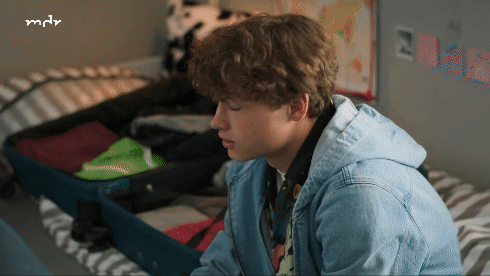
Auf Noah wirkt das wie ein Friedensangebot, ein olive branch. Was letztes Jahr passiert ist, ist abgehakt. Zwischen uns ist alles gut.
Ehrlich froh, von seinen Eltern weg zu sein und wieder mit seinen Freunden vereint zu sein, schmeißt Noah sich auf sein Bett: „Wisst ihr was? Ich bin echt froh, wieder hier zu sein.“
Das nächste Gespräch geht somit von Noah aus. Er geht auf Colin zu und fragt, ob sie was unternehmen wollen; für einen Film brainstormen (Film drehen = vertraut und neutral = sicheres Thema). Man sieht deutlich, dass Noah nervös ist in der Unterhaltung und versucht Colins Reaktion zu interpretieren. Als Colin dem Treffen zustimmt, fragt Noah sicherheitshalber noch einmal nach: „Wirklich?“ Ist es wirklich okay, dass wir wieder Zeit miteinander verbringen? Als Freunde?
In Colins Antwort sieht er schließlich die Bestätigung darin, dass sie mit dem Thema Liebe abgehakt haben (wenn auch nicht zwangsläufig mit den Gefühlen selbst. Denn Noah weiß natürlich, wie er immer noch für Colin fühlt, aber sie sind sich einig, dass sie die Gefühle ruhen lassen und ihre Freundschaft das Wichtigste ist – denkt Noah.)
Colin hingegen interpretiert das Gespräch natürlich ganz anders. Er sieht in Noahs Verhalten Annäherungsversuche und wird in dessen Blicken natürlich auch bestätigt.
Somit kommen wir schließlich bei der Situation in Folge 1055 an:
Colin versteht nicht, wie Noah ihm so verliebte Blicke zuwerfen und gleichzeitig so tun kann, als wäre nie was zwischen ihnen gewesen.
Noah hingegen ist ehrlich überrascht, als Colin das Thema wieder anspricht.
„Ich hab‘ gedacht, wir haben das abgehakt!“
Er sagt es nicht aus Provokation oder Ablenkung, in seinen Augen hatten sie das Thema eben tatsächlich abgehakt.
Es kommt zum Streit.
Mit „Hab‘ ich dich darum gebeten, oder was?! Geh doch! Machst eh alles kaputt mit deinem Gefühlsscheiß! Ja genau, verpiss dich!“ schlägt Noah am Ende über die Stränge. Er fühlt sich eingeengt und aus Schutz teilt er lieber aus und verletzt Colin dabei aktiv.
Zuvor jedoch? Kann man keinem der beiden Schuld geben. Oder beiden zusammen. Beide haben nichts „falsch“ gemacht, beide wollten die andere Person nicht verletzen – tun es aber, weil sie nicht das für die andere Person sein können, was diese gerade braucht.
Noah hat dabei vielleicht in Kauf genommen, Colin falsche Hoffnungen zu machen.
Colin hat dabei vielleicht in Kauf genommen, Noahs Ablehnung zu ignorieren.
Beide tun dies nicht böswillig, sondern weil sie alles aus ihrer eigenen Perspektive interpretieren/beurteilen – und auch für den anderen mitdenken.
Sie interpretieren ihre Gespräche grundsätzlich verschieden.
Beide legen die Worte des jeweils anderen so aus, dass sie zu ihrer eigenen Welt-(Wunsch-)Vorstellung passen. Es wird zwar das gleiche gesagt, aber sie ziehen unterschiedliche Schlussfolgerungen daraus (Noah deutet Colins Annäherungen als freundschaftliches Friedensangebot, Colin deutet Noahs Annäherungen als romantische Geste). Die beiden reden letztendlich aneinander vorbei und deshalb musste es in Folge 1055 auch zum Streit kommen.
Ein Streit mit eigentlich dem gleichen Ergebnis von Staffel 26: Noah kann sich nicht auf die Liebe einlassen, Colin kann nicht nur mit Noah befreundet sein.
Dieses Mal zieht Colin jedoch die echten Konsequenzen daraus, und verlässt das Einstein.
Fazit:
Natürlich sind wir sauer auf Noah, weil Colin wegen ihm immer und immer wieder verletzt wird. Und natürlich könnte man sagen, dass es naiv von Noah ist, zu glauben, dass sie das mit der Liebe einfach so abhaken konnten. Aber letztendlich ist es nur
a) Folge seiner negativen Erfahrungen durch die Beziehung seiner Eltern (wie wir schon längst wissen)
b) Folge Noahs und Colins misslungener Kommunikation in Staffel 27 - und zwar von beiden Seiten aus. Beide sehen das, was sie sehen wollen (und mit ihren Lebenserfahrungen sehen können) und schaffen es nicht, sich vollständig in die andere Person hineinzuversetzen (they are 15, give them a break).
Aber das muss nicht so bleiben!
Colin hat nichts falsch gemacht und ist dementsprechend aus gutem Recht jetzt nach Köln gegangen, um Abstand zwischen sich und Noah zu bringen.
Noah hat (fast) genauso wenig falsch gemacht, muss/kann jetzt aber daran arbeiten, seine Ängste zu überwinden und Colin schließlich beweisen, dass er es ernst meint und bereit ist, für ihre Liebe zu kämpfen.
Und dann gibt es unser lang ersehntes Nolin Happy End, yay!
#schloss einstein#in defence of noah temel#bevor er heute abend wieder neue scheiße bauen kann lol#forever noah hater and noah defender at heart#noah und colin brauchen einfach eine feste umarmung#und ich dann auch bitte?#sorry für den rant aber es hat mich einfach nicht losgelassen
46 notes
·
View notes
Text
Prisoner
Marius was, in fact, a prisoner.
The hand which had seized him from behind and whose grasp he had felt at the moment of his fall and his loss of consciousness was that of Jean Valjean.
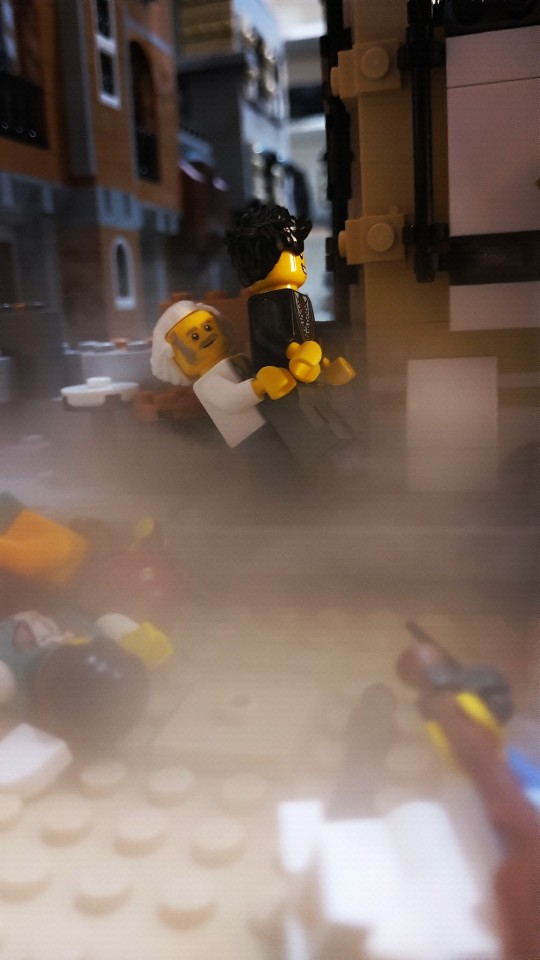
Jean Valjean had taken no other part in the combat than to expose himself in it. Had it not been for him, no one, in that supreme phase of agony, would have thought of the wounded. Thanks to him, everywhere present in the carnage, like a providence, those who fell were picked up, transported to the tap-room, and cared for. In the intervals, he reappeared on the barricade. But nothing which could resemble a blow, an attack or even personal defence proceeded from his hands. He held his peace and lent succor. Moreover, he had received only a few scratches. The bullets would have none of him. If suicide formed part of what he had meditated on coming to this sepulchre, to that spot, he had not succeeded. But we doubt whether he had thought of suicide, an irreligious act.
Jean Valjean, in the thick cloud of the combat, did not appear to see Marius; the truth is, that he never took his eyes from the latter. When a shot laid Marius low, Jean Valjean leaped forward with the agility of a tiger, fell upon him as on his prey, and bore him off.
The whirlwind of the attack was, at that moment, so violently concentrated upon Enjolras and upon the door of the wine-shop, that no one saw Jean Valjean sustaining the fainting Marius in his arms, traverse the unpaved field of the barricade and disappear behind the angle of the Corinthe building.
The reader will recall this angle which formed a sort of cape on the street; it afforded shelter from the bullets, the grape-shot, and all eyes, and a few square feet of space. There is sometimes a chamber which does not burn in the midst of a conflagration, and in the midst of raging seas, beyond a promontory or at the extremity of a blind alley of shoals, a tranquil nook. It was in this sort of fold in the interior trapezium of the barricade, that Éponine had breathed her last.
There Jean Valjean halted, let Marius slide to the ground, placed his back against the wall, and cast his eyes about him.
The situation was alarming.
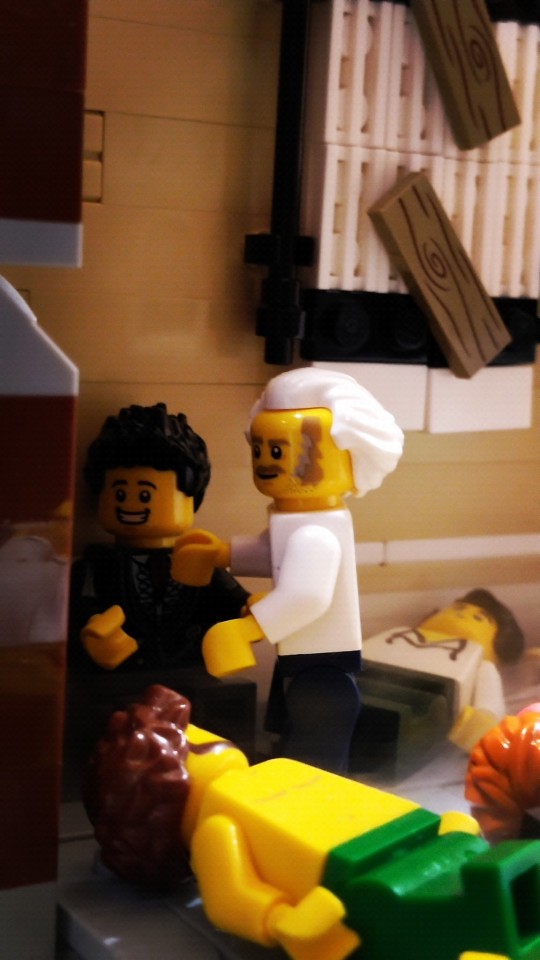
For an instant, for two or three perhaps, this bit of wall was a shelter, but how was he to escape from this massacre? He recalled the anguish which he had suffered in the Rue Polonceau eight years before, and in what manner he had contrived to make his escape; it was difficult then, to-day it was impossible. He had before him that deaf and implacable house, six stories in height, which appeared to be inhabited only by a dead man leaning out of his window; he had on his right the rather low barricade, which shut off the Rue de la Petite Truanderie; to pass this obstacle seemed easy, but beyond the crest of the barrier a line of bayonets was visible. The troops of the line were posted on the watch behind that barricade. It was evident, that to pass the barricade was to go in quest of the fire of the platoon, and that any head which should run the risk of lifting itself above the top of that wall of stones would serve as a target for sixty shots. On his left he had the field of battle. Death lurked round the corner of that wall.
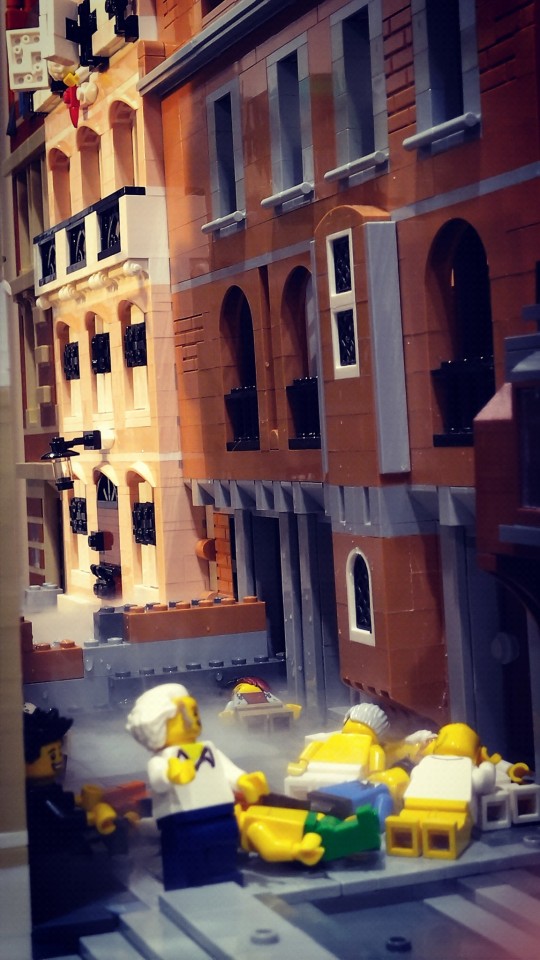
What was to be done?
Only a bird could have extricated itself from this predicament.
And it was necessary to decide on the instant, to devise some expedient, to come to some decision. Fighting was going on a few paces away; fortunately, all were raging around a single point, the door of the wine-shop; but if it should occur to one soldier, to one single soldier, to turn the corner of the house, or to attack him on the flank, all was over.
Jean Valjean gazed at the house facing him, he gazed at the barricade at one side of him, then he looked at the ground, with the violence of the last extremity, bewildered, and as though he would have liked to pierce a hole there with his eyes.
By dint of staring, something vaguely striking in such an agony began to assume form and outline at his feet, as though it had been a power of glance which made the thing desired unfold. A few paces distant he perceived, at the base of the small barrier so pitilessly guarded and watched on the exterior, beneath a disordered mass of paving-stones which partly concealed it, an iron grating, placed flat and on a level with the soil. This grating, made of stout, transverse bars, was about two feet square. The frame of paving-stones which supported it had been torn up, and it was, as it were, unfastened.
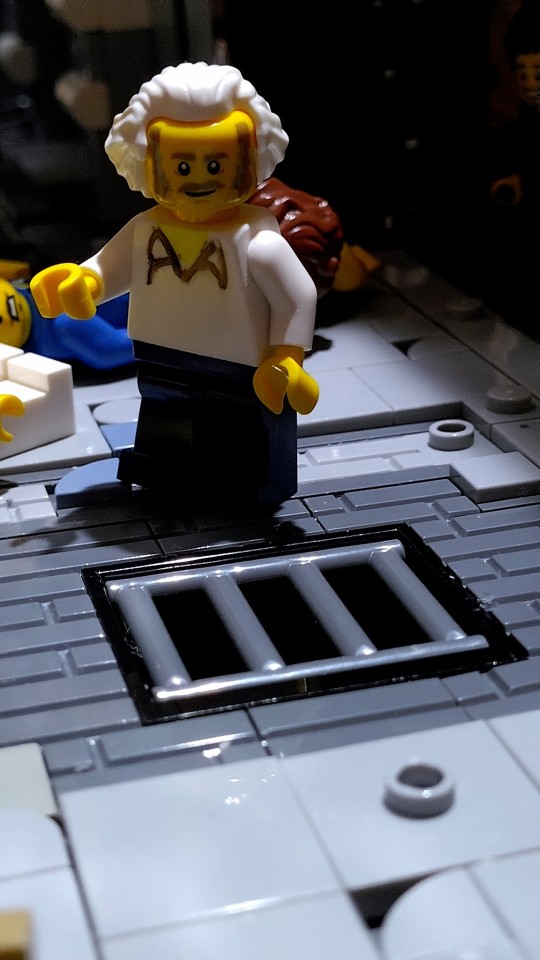
Through the bars a view could be had of a dark aperture, something like the flue of a chimney, or the pipe of a cistern. Jean Valjean darted forward. His old art of escape rose to his brain like an illumination. To thrust aside the stones, to raise the grating, to lift Marius, who was as inert as a dead body, upon his shoulders, to descend, with this burden on his loins, and with the aid of his elbows and knees into that sort of well, fortunately not very deep, to let the heavy trap, upon which the loosened stones rolled down afresh, fall into its place behind him, to gain his footing on a flagged surface three metres below the surface,—all this was executed like that which one does in dreams, with the strength of a giant and the rapidity of an eagle; this took only a few minutes.
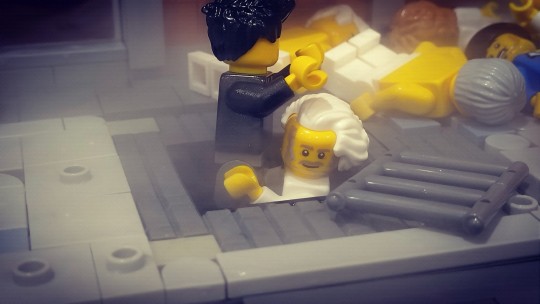
Jean Valjean found himself with Marius, who was still unconscious, in a sort of long, subterranean corridor.
There reigned profound peace, absolute silence, night.
The impression which he had formerly experienced when falling from the wall into the convent recurred to him. Only, what he was carrying to-day was not Cosette; it was Marius. He could barely hear the formidable tumult in the wine-shop, taken by assault, like a vague murmur overhead.
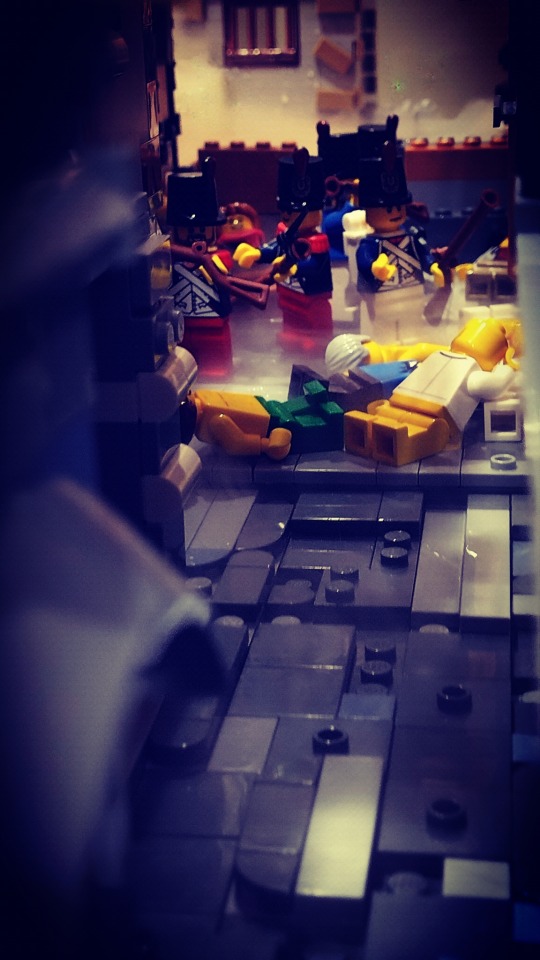
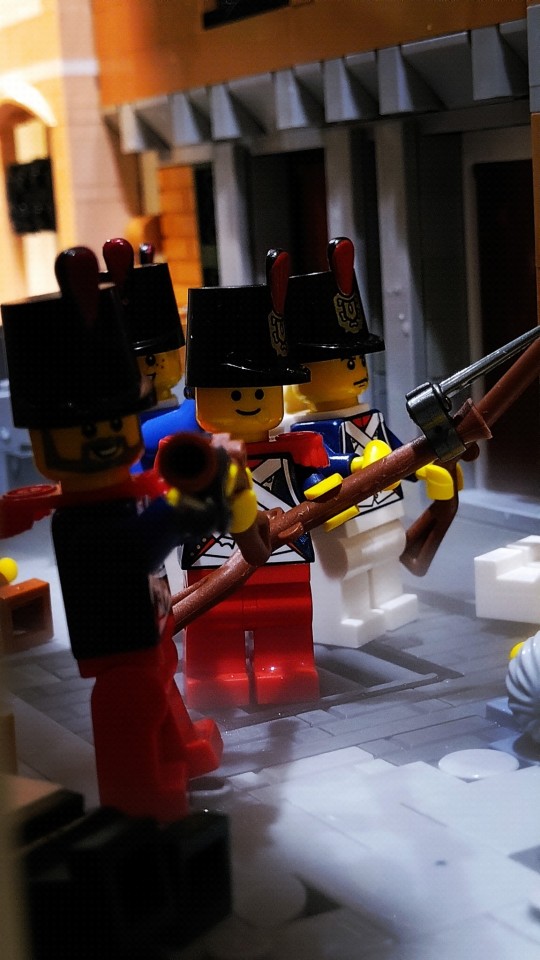
#lm 5.1.24#the brick in brick#barricade day#les miserables#lego#and that's it!#hope you've enjoyed it!#...for barricade day values of 'enjoy' :D
35 notes
·
View notes